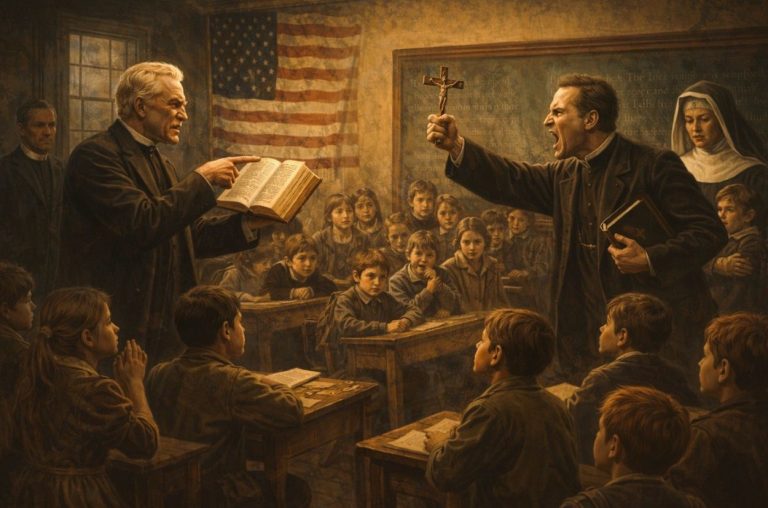

What is unfolding is not just an attack on policy. It is an effort to redefine the purpose of the university itself. No longer a crucible for dissent or discovery, but a factory for ideological compliance.

By Matthew A. McIntosh
Public Historian
Brewminate
Introduction: A War of Ideas with Real Consequences
In a political climate where spectacle too often supplants substance, a quieter battle is unfolding—one that could reshape the intellectual foundations of the country. Donald Trump’s return to power in 2025 has brought with it a renewed and sharpened focus on American academia. But this is no mere culture war skirmish or election-season rhetoric. What is emerging from the administration and its network of think tanks, donors, and media surrogates is a comprehensive effort to strip universities of their diversity, equity, and inclusion (DEI) infrastructure, curtail public research funding, and pressure institutions into adopting an ideologically conservative framework.
What is at stake is not simply administrative reshuffling or budgetary adjustment. At stake is the very notion of the university as a space for pluralism, inquiry, and dissent. This is a project of deconstruction, carried out with the calculated precision of political engineering and the unspoken hope that many of the nation’s brightest will, quite literally, leave.
From DEI to Departmental Dismantling: The Right’s Long March Through the Universities
The attack on DEI did not begin with Trump’s second term, but his administration has transformed what began as isolated state-level efforts into a national agenda. Building on momentum from governors like Ron DeSantis in Florida and Greg Abbott in Texas, Trump has empowered the Department of Education to begin withholding federal grants from institutions with “politically discriminatory” hiring practices. This term, left intentionally vague, is designed to target positions focused on race, gender, and social justice.
According to the American Council on Education, more than 75 percent of public universities had established some form of DEI office by 2022. These programs, often derided by conservatives as “ideological indoctrination,” have played crucial roles in creating pathways for first-generation college students, expanding mental health resources for marginalized groups, and broadening curriculum representation. The Trump administration’s view, however, is that these initiatives “promote resentment” and “undermine merit.”
The University of California system alone receives over $10 billion annually in federal research grants. Stripping that funding, even partially, would be catastrophic, not only to faculty lines but to scientific innovation and graduate education.
Censorship in the Syllabus: Imposing Rhetorical Orthodoxy from the Top
Beyond defunding DEI, the administration has made clear its intention to challenge what it calls “left-wing curriculum dominance.” The Heritage Foundation, which has helped shape Trump’s higher education policy, published a 2024 manifesto urging the federal government to “reclaim American universities from ideological capture.” The blueprint proposes banning any federal funds for classes that teach “critical race theory, gender ideology, or anti-capitalist frameworks.”
What might once have seemed hyperbole is now working its way into policy. The Department of Education has proposed new Title IV regulations that would require all federally funded institutions to offer “intellectual diversity reporting,” including disclosures on political affiliation of faculty and course syllabi. Though still in its early stages, this effort has the support of influential figures in Congress and the Federalist Society.
Students are already feeling the effects. At Texas Tech, the Political Science department was told to remove the word “decolonial” from syllabi before submitting them to the Board of Regents. At Florida State University, an LGBTQ history course was quietly canceled after a trustee flagged it as “cultural grooming.” Faculty across the country are preemptively editing their course titles to avoid scrutiny. This is not simply an attack on language; it is a purge of frameworks, narratives, and interpretations that threaten a monolithic view of American history.
Research in Retreat: The Brain Drain Begins
One of the lesser-known yet devastating aspects of the administration’s agenda lies in its approach to scientific and social research. Trump’s 2025 budget proposal includes a 42 percent cut to the National Science Foundation and eliminates the National Endowment for the Humanities entirely. The justification? “Reprioritization toward technical outcomes and away from cultural subversion.”
It is a chilling phrase. And for early-career researchers, particularly those in the social sciences or working on climate change, reproductive health, and race, the signal is clear. Look elsewhere.
Universities have cut new PhD admissions for fall 2025 in light of the cuts. STEM fields are faring better, but only marginally. Eric Schuster, a lab assistant in a coral reef biology lab at the Scripps Institute of Oceanography (SIO), told The Guardian, “There are several labs, both at our institution and around the US, that have essentially just sent everyone home because they have no money.”
Private institutions are not immune. While they retain some independence, many depend heavily on federal student aid and research grants. They too are beginning to tread carefully. A recent Columbia internal memo warned faculty to avoid “controversial grant language” if applying for NIH funding.
A New Educational McCarthyism: Ideological Loyalty Over Intellectual Inquiry
At the core of this crusade is a return to loyalty tests. Not formal oaths (at least not yet) but a soft form of vetting that prioritizes alignment over achievement. Trustees are being replaced with political appointees. Faculty tenure is under siege. And a new class of university president is emerging: politically connected, rhetorically safe, and loyal to the populist cause.
This isn’t simply conservatism in ascendance. It is anti-intellectualism with a vengeance, cloaked in the rhetoric of “free speech” and “viewpoint neutrality.” But as has become increasingly evident, what is meant by neutrality is often enforced silence. What is defended as free speech is limited to a narrow band of acceptable orthodoxy.
The consequences extend far beyond campus walls. Universities have long been sites of cultural production, policy innovation, and public critique. Weakening them hollows the civic sphere. It flattens the intellectual terrain into something easier to police, easier to monetize, and easier to ignore.
Resistance, For Now: Faculty, Students, and the Fight to Remain
Not all is acquiescence. Across the country, faculty senates are passing resolutions against political interference. Legal advocacy groups are preparing lawsuits. Students, often more nimble than their professors, are creating off-campus networks to continue discussions now barred in class.
In California, a coalition of students and faculty launched “The Free Inquiry Project,” an online repository of banned syllabi, lecture videos, and readings flagged by state monitors. In Massachusetts, faculty from Harvard, Amherst, and UMass have launched a joint fund to support scholars fleeing states with hostile academic policies. It is a kind of underground railroad for thinkers.
But resistance, while real, remains uneven. Many scholars are simply exhausted. Others cannot afford to fight. And in a time when student debt still crushes millions, when job security in academia is vanishing, and when political violence simmers at the edge of discourse, idealism may not be enough.
Conclusion: What is the University For?
What is unfolding is not just an attack on policy. It is an effort to redefine the purpose of the university itself. No longer a crucible for dissent or discovery, but a factory for ideological compliance. No longer a refuge for the misfit, the radical, or the dreamer, but a checkpoint of national purity.
And so the real question lingers, quiet, sharp, and unresolved: Who gets to decide what knowledge is worth having? In this new era of American governance, the answer may not be scholars, but senators. Not teachers, but tacticians. And in the silence that follows, a generation may choose to think elsewhere. Or not at all.
Originally published by Brewminate, 08.01.2025, under the terms of a Creative Commons Attribution-NonCommercial-NoDerivatives 4.0 International license.


